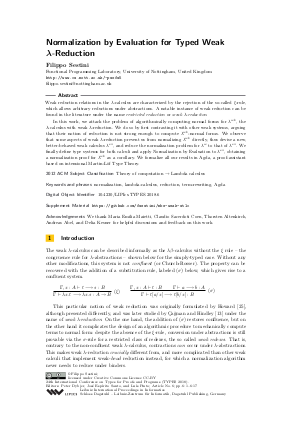@InProceedings{sestini:LIPIcs.TYPES.2018.6,
author = {Sestini, Filippo},
title = {{Normalization by Evaluation for Typed Weak lambda-Reduction}},
booktitle = {24th International Conference on Types for Proofs and Programs (TYPES 2018)},
pages = {6:1--6:17},
series = {Leibniz International Proceedings in Informatics (LIPIcs)},
ISBN = {978-3-95977-106-1},
ISSN = {1868-8969},
year = {2019},
volume = {130},
editor = {Dybjer, Peter and Esp{\'\i}rito Santo, Jos\'{e} and Pinto, Lu{\'\i}s},
publisher = {Schloss Dagstuhl -- Leibniz-Zentrum f{\"u}r Informatik},
address = {Dagstuhl, Germany},
URL = {https://drops.dagstuhl.de/entities/document/10.4230/LIPIcs.TYPES.2018.6},
URN = {urn:nbn:de:0030-drops-114101},
doi = {10.4230/LIPIcs.TYPES.2018.6},
annote = {Keywords: normalization, lambda-calculus, reduction, term-rewriting, Agda}
}

 Creative Commons Attribution 3.0 Unported license
Creative Commons Attribution 3.0 Unported license



































